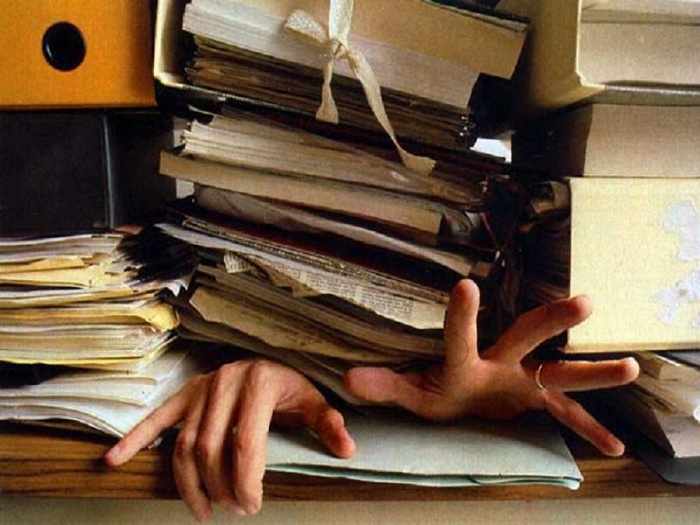Suhan's bureaucracy of producing spirit

Experts believe bureaucratic decline is one of the main ways to boost production; therefore, stakeholders, especially when the market is in recession, must step in to reduce bureaucracy and keep producers open.
According to the International Stone Exhibition of Iran, bureaucracy and administrative bureaucracy, followed by a change in the rules by the stakeholders, if they are too common, to the extent that they affect their purpose, will undoubtedly become a process of erosion and for those in Production is in operation, rather than cumbersome.
Experts believe bureaucratic decline is one of the main ways to boost production; therefore, stakeholders, especially when the market is in recession, must step in to reduce bureaucracy and keep producers open.
Bureaucracy
On the bureaucracy process in the production process Tohid Jafarzadeh, Zafar Bonab's Steel Marketing and Export Director stated: Any bureaucracy that arises in an administrative mechanism is undoubtedly associated with a cause; It creates it, but the problem arises when a bureaucracy is created, but it does not specify the purpose of the determinants, which may then be subject to producer, importer and exporter objections. Sometimes the bureaucracy becomes so complex that it distorts its purpose and moves away from it and impedes production rather than facilitation.
"But now we have to bear in mind that we are in a state of war despite economic sanctions, and many laws and bureaucracies have been formed on this basis over the past two years," Jaafarzadeh said.
He said: "Given the current situation, we have to admit that we have to adapt to the current situation, because along with sanctions and stricter conditions, there will be solutions for a bureaucracy in the country."
Bureaucratic costs
Ali Javadi, managing director of Alborz Industry Strategy Company, also said about the impact of bureaucracy on the production process: Producers are trapped more than ever before in the bureaucratic bureaucracies and these bureaucracies create more barriers for producers and have become their souls.
Javadi went on to say that, of course, officials claim to be trying to reduce bureaucracies, but contrary to their claims, bureaucracy is becoming more and more complex every day.
Referring to the issue that bureaucracies and laws have undergone a lot of changes over the past few years, he said: "Before, if there were ten licenses needed to set up or get equipment or import and export, now the number of licenses has doubled. Instead of reducing the trend, authorities have increased it and created more barriers for manufacturers.
Javadi went on to say: Manufacturers should hire people to get these licenses, which will cost them a whole lot.
The CEO of Alborz Industry Strategy continued: On the other hand, obtaining these licenses has become a means of abuse and extortion for the private sector, and this in turn has made it difficult for producers.
"In the current situation, economic problems and inflation, on the one hand, and increasing licensing and bureaucracies, on the other hand, have closed the hands of the producers," he said. Of course, this does not mean that manufacturers or marketers are against authorizing and pursuing a formal way of doing business, but that the increase in licenses and laws and changing them every day has made it difficult for manufacturers to The field is not smooth.
Remove the paper bureaucracy
Afshin Moghtadar, executive vice president of Pars Aluminum Company, said: "Bureaucracy can be import-related in one context, and since imports can in some ways be a competitor to production, it can be useful in this regard, as it paves the way for import control.
Moghtadar went on to note: For example, if a person or company wants to make a custom registration in another province and inquire about imports, in fact this could be an opportunity for manufacturers in different provinces to provide the product for sale.
He added: "On the other hand, if a manufacturing company wants to import materials because its production line is in trouble, the administrative bureaucracy may delay the production of these units.
Executive Vice President of Pars Aluminum Factory Company pointed out ways to reduce bureaucracies in the country: In general, bureaucracy is now out of paper all over the world and is moving towards cyberspace and internet.
Referring to the fact that virtualizing bureaucracies can be accompanied by a few good ones, Moghtari said: Removing paper bureaucracy on the one hand can reduce its transactions and costs at the city level, because in-person visits are costly, while Going forward on the one hand reduces the level of physical transactions, reducing costs and reducing offenses.
In fact, for the order to be registered and exported, the part that contradicts the rules may require attendance, but if the rules are in the same context, it minimizes the need for physical presence.
"In the country, systems are moving towards cyberspace capabilities, and this can be useful for manufacturers," he said.










